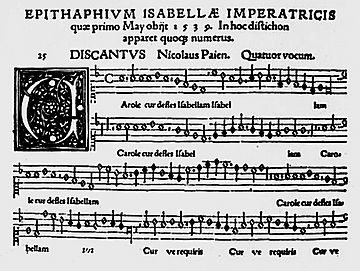Nicolas Payen facts for kids
Nicolas Payen (also known as Nicolas Colin) was a talented composer and choirmaster from the Renaissance period. He was born around 1512 in Soignies, a town in what is now Belgium. Payen worked for the powerful Habsburg royal family, especially for Emperor Charles V. He was known for his beautiful vocal music.
A Young Musician's Journey
Nicolas Payen started his music training at a young age in his hometown of Soignies. When he was about 13 years old, he moved to Spain. There, he joined the choir of Emperor Charles V. It was common for young singers from the Low Countries (like Belgium and the Netherlands today) to be recruited for the royal chapel.
During the 1540s, Payen moved up in the chapel's ranks. He became a clerk, then a chaplain. In 1556, he took over as the maestro di capilla. This important role meant he was the main director of music for the royal chapel. He took over from Cornelius Canis, who had retired. This made Payen the first music director for Philip II of Spain, who became king after Charles V.
Payen also received special honors, including becoming a canon at a church in Tournai in 1558. He passed away in Madrid in 1559 or shortly after.
Payen's Music
Nicolas Payen wrote both religious and non-religious music. All of his surviving music was meant to be sung. Some of his songs, called chansons, were later played on a lute, which is a string instrument.
We still have 13 of his religious songs, called motets, and five of his French chansons. Some of his motets were written for important events. For example, Carole cur defles was written in 1545 when Queen Isabella died. One of his motets, In Gott gelaub ich das er hat, is in German. All of his motets are for four or five voices. His chansons are all for four voices and are in French.
Payen's name is connected to a special style of music called musica reservata. This style became popular around the mid-1500s. It focused on making the words of the song very expressive. It also used interesting harmonies and was often performed for smaller groups of people who really understood music.
A letter from the Bavarian ambassador mentioned Payen. He wrote that musica reservata would become even more popular when Payen became the music director. This shows that Payen was seen as a composer with a more modern and expressive style compared to some older composers.
Motets
- Virgo prudentissima
- Coenantibus illis
- Carole cur defles Isabellam
- Nunc dimittis
- Resurrectio Christi/Surrexit
- Qui dabit capiti
- Convertimini ad me
- Domine, deus salutis
- Confitemur delicta
- Nisi quia Dominus erat in nobis
- Benedictus Dominus Deus Israel
- Eripe me de inimicis meis Domine
Songs
- Fringotes jeusnes fillettes
- Hau de par Dieu
- Il y a de lognon
- Je ne me puis tenir
- Avecque vous mon amour finira
- Vien tost despiteux desconfort
Choir
- In Gott gelaub ich das er hat
Recordings
You can hear some of Payen's music on the album Tota Vita – Music for Charles V. It includes 3 motets and 6 chansons by Payen. The music is performed by the Egidius Kwartet.
See also
 In Spanish: Nicolas Payen para niños
In Spanish: Nicolas Payen para niños
 | Kyle Baker |
 | Joseph Yoakum |
 | Laura Wheeler Waring |
 | Henry Ossawa Tanner |


